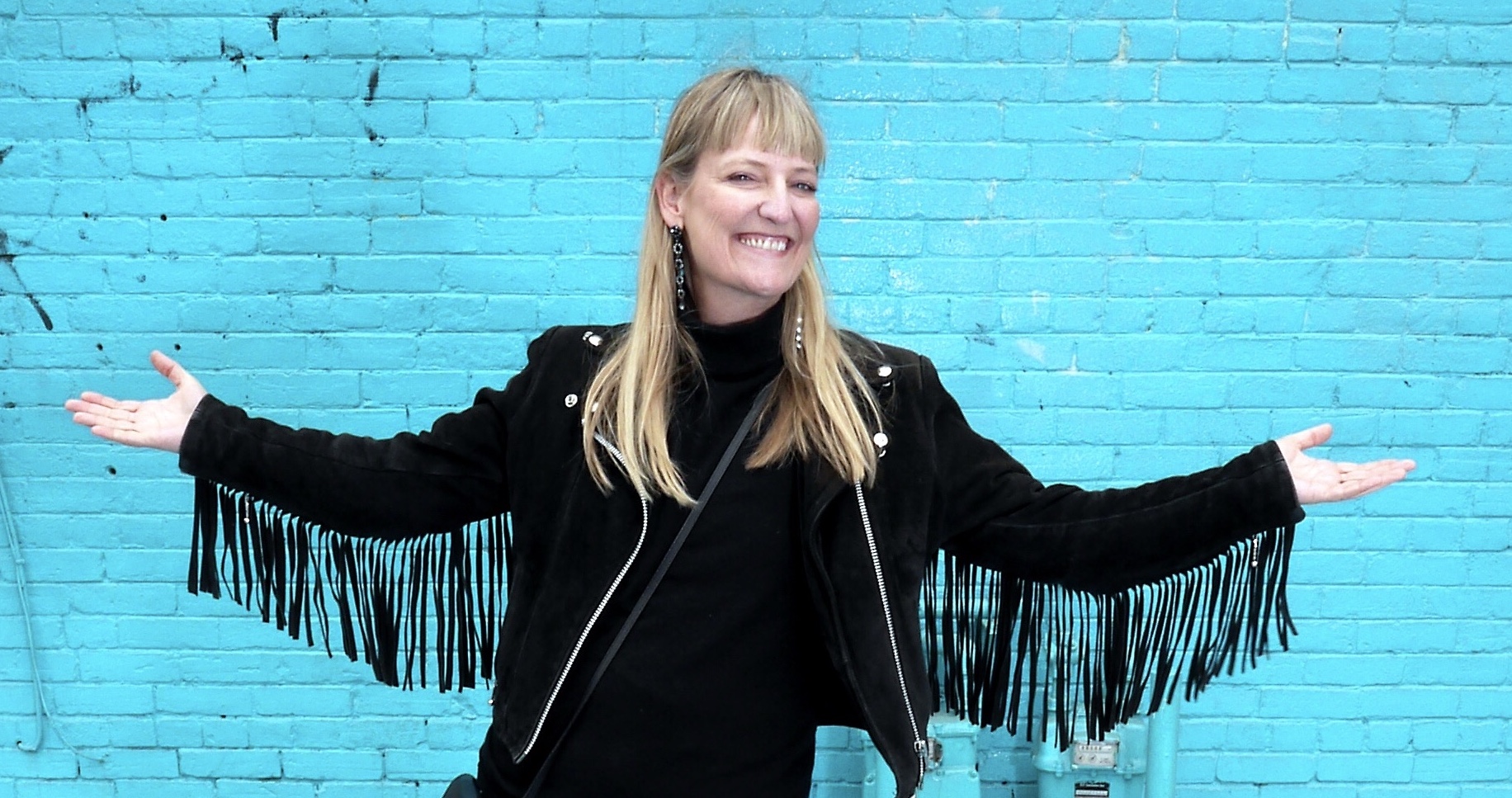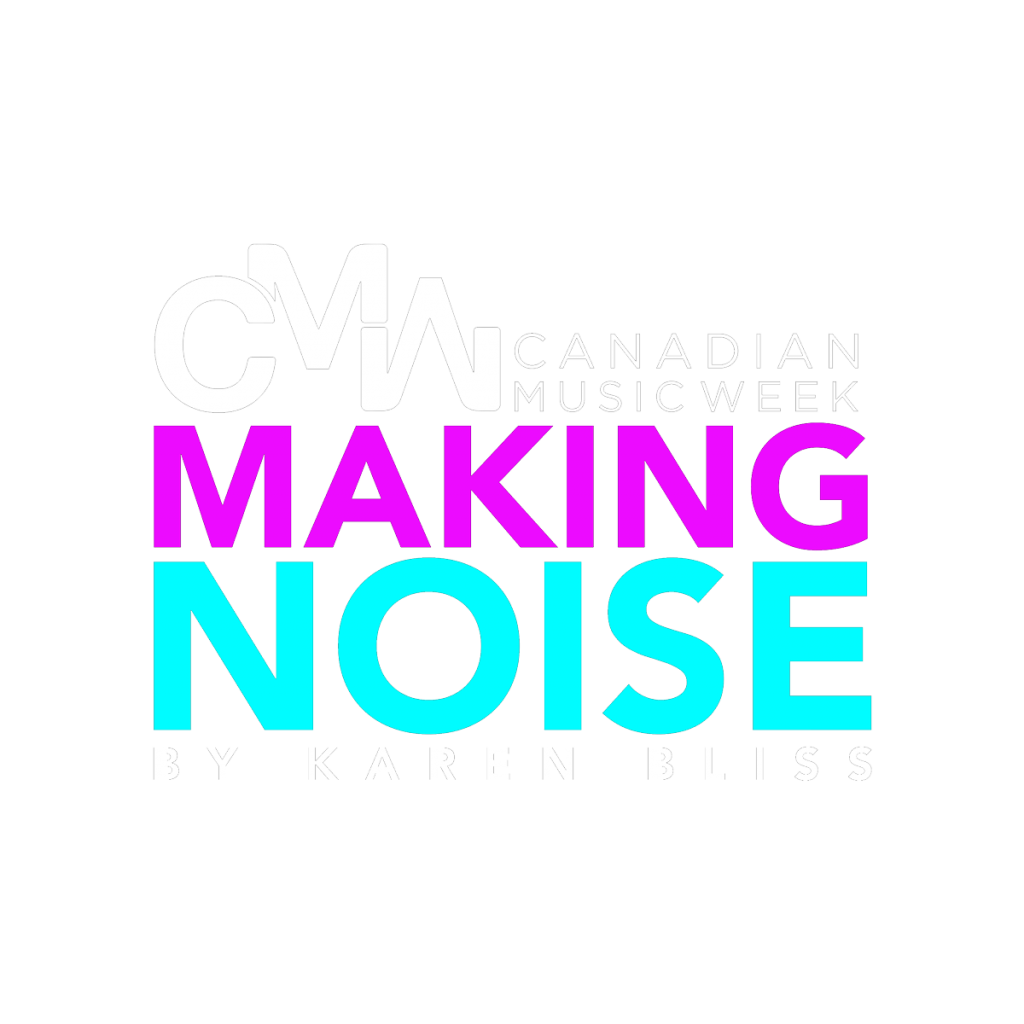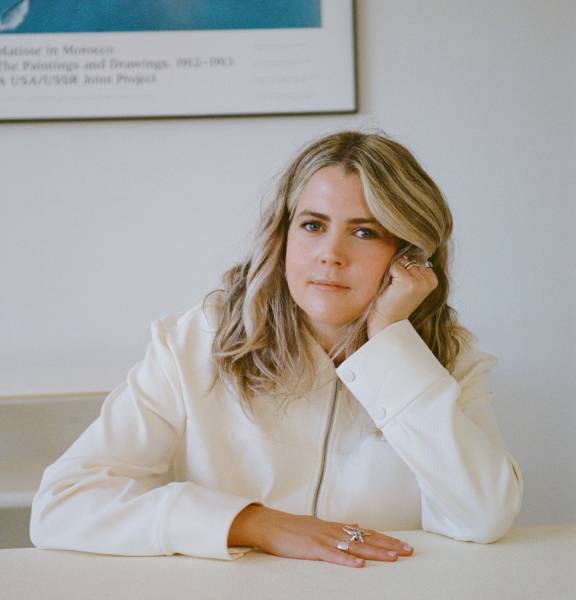BY KAREN BLISS
CEO Shauna de Cartier wanted a career where she could “just be me all the time,” a textbook entrepreneur and path finder with an affinity for the arts. So the Edmonton native with an MBA from the University of Alberta abandoned a future up the corporate ladder and started managing a band, Captain Tractor. That was in 1998. Two years later, she moved to Toronto and started Six Shooter Records, which next year celebrates its silver anniversary.
“We are a team of 15 high-performance ninjas,” de Cartier tells Making Noise of her mostly female staff.
Her business partner is Helen Britton, with whom she started a new company in 2004, Six Shooter Inc., and moved her management roster over to that entity.
On the management side, Six Shooter currently represents William Prince, Tanya Tagaq, Whitehorse, The Dead South, Nyssa, July Talk, and Rheostatics, all of whom are signed to the label, which also has Boy Golden, Elliott Brood, T. Thomason, and Peter Dreams on its roster.
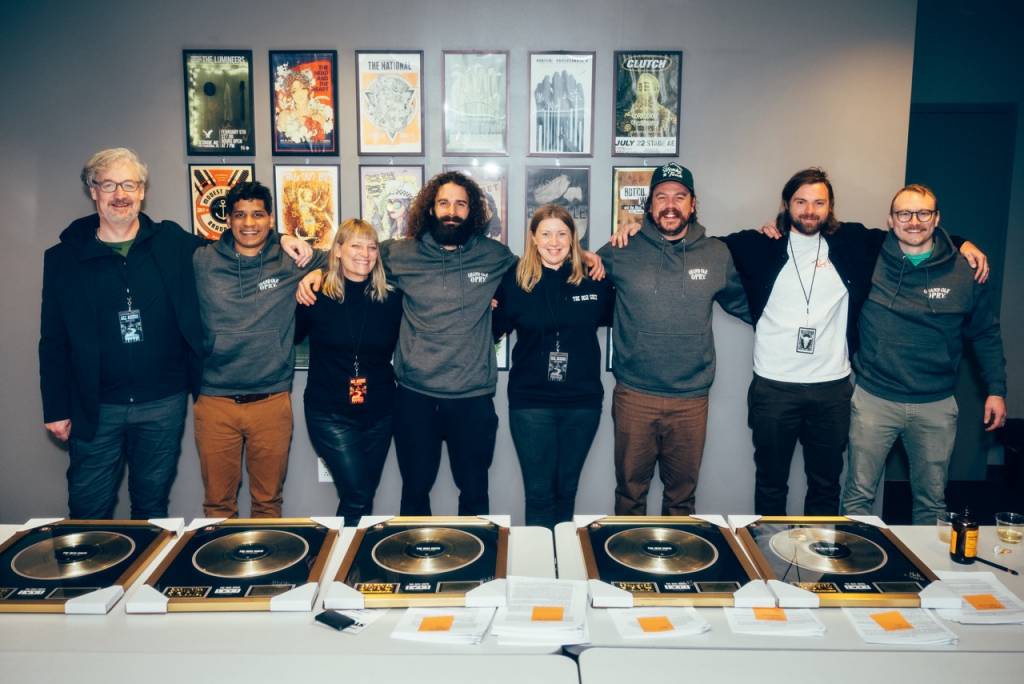
Their biggest success in the last year is The Dead South, who achieved gold status in Canada for the 2014 album Good Company, and platinum in America for their 2014 single, “In Hell, I’ll Be in Good Company.” The band also sold 125,000 tickets internationally across 48 shows, including their first Australia/New Zealand tour. Their merchandise business averaged almost $16 per head.
Throat singer and multi-disciplinary creative Tagaq also had a knock-out year, full of interesting opportunities and deals. She furthered her writing career with a piece in the Dear Rebel book; 2018’s Split Tooth novel was published in the UK; she completed the first of two children’s books and signed a deal for a second novel. Her 2022 directorial debut, Ever Deadly, also received a national theatrical release, and she composed songs for the HBO True Detective series and had a small role. Recently, she enjoyed an artistic collaboration and residency at Brown University in Rhode Island, and has also been composing with the Kronos Quartet.
Prince also had a breakthrough year, making his Grand Ole Opry debut, doing live collaborations with The War and Treaty and Willie Nelson, earning an emerging artist nomination from the Americana Music Association, and a pair of Juno nominations. He is just wrapping up a coast-to-coast headline tour in the country’s largest soft seat theatres, after which he’ll be in Halifax this weekend for the Juno Songwriters’ Circle and the Juno Awards.
Six Shooter also won a 2023 Canadian Sync Award for Indie Label of the Year for landing high profile international sync placements and just this month de Cartier was awarded the Career Achievement Honour from Women In Music Canada.
She spoke to Making Noise about how she got from 1 to almost 25, how U2’s manager unknowingly influenced a major life decision, how her newborn baby led her to partner with Britton, and how Tagaq “deconstructed the house.”
You’re approaching 25 years since starting Six Shooter. Many people who started a label back then did it with no plan, just sitting around their kitchen table putting stickers on mailing envelopes. You got your MBA (Master of Business Administration). How did that prepare you?
I started working on an MBA in 1994. I was doing it part-time, while I worked full-time. The reason why I went into the MBA program was to give me an extra leg up in the corporate world. That’s a really helpful credential to move you further up that ladder.
What were you doing full-time?
In the beginning, I was working for a restaurant company. I was the director of marketing, and then I got a job with Commonwealth Stadium in Edmonton. I was the director there.
Was music a key part of your teen years?
I studied classical piano. I was a piano teacher. I would go to live music gigs, sometimes by myself.
Well, that’s a big deal.
But, it wasn’t really the direction that I was going. My first real job after graduating from university, I worked at the Phoenix Theatre in Edmonton. That was a very transformative experience for me because, even though I didn’t know that I was looking for my people, I found them — this world of art and artists. I learned that there. The values and the ethos of the Phoenix Theatre is largely what I took with me when I eventually started Six Shooter.
Also, significantly, in the MBA class, I took this course on entrepreneurship and that was another transformative, life-changing moment because I never thought about going into business for myself. My dad’s a teacher; my mom’s a housewife; it wasn’t what we talked about around the dinner table.
I’m sure many people in the MBA program weren’t thinking of applying it to the arts.
Especially in Alberta. The University of Alberta is a very science-heavy school. The other people in the program were mostly engineers and mostly men. I took that class, and you you open up the textbook and they describe these attributes of an entrepreneur and I’m like, “Well, this is me.” I was really into that class. [In 2019, de Cartier received the Canadian Independent Music Award (CIMA) for Entrepreneurship]
Then, at the stadium, I was offered a promotion. That was a surprise because I hadn’t been there that long. At the same time, people were offering me jobs all in the same week. I call it the frying-pan-to-the-head moment where I should figure out what I want to do. I was just blindly grinding up the ladder without much thought, but that situation made me think about it because it was like, “Oh, I’m getting this promotion and I can now see the path where I’m going to go. I’m going to get that job and then that job, bang, bang, bang. I’m going to be probably the vice president of marketing for some Alberta oil and gas company and make a lot of money, but it won’t really be meaningful in the end. I want to get back to a place that I had at the theatre, where who I was and what I did was the same. I didn’t have to be like, this is who I am. And that’s what I do. I wanted to just be me all the time.
I had that at the theater company, but I didn’t really like the non-profit model. So, one of the jobs that was offered to me that week was by my friends in the band Captain Tractor, who had played at my wedding. I met them at the theatre. They’re a very successful band. They were totally independent. They started their own distribution company with a woman named Melanie Cheek. They had a booking agent and that was all they needed. They were really enterprising and successful. They sold like a hundred thousand records by themselves. That’s a lot of records, right? They asked me to manage them. And so, I was considering all the different pathways if I took this job or that job or the other job. And so much to everybody’s surprise, I quit my job at the stadium. I turned down the promotion and I started managing a band. That was really a head-scratcher for everybody around me.
At the stadium, during the time that I was there, we had the Rolling Stones and we had U2. When U2 came, they had two nights. They sold a hundred thousand tickets in Edmonton. This was a really big deal. I had an all-access pass and I was like, “Wow, this is incredible.”
And then I realized what a venue does is parking, security, concessions. Those are important jobs. We had an office down the hall from me that was set up for Paul McGuinness [then U2’s manager]. And I was like, “I want to be in that office.” [laughs] And so when one of my staff was like, “Why are you leaving?” I said, “I’ll be back, but I’m going to be in that office.”
I left and I started working managing Captain Tractor. I didn’t know the music business at all. And they taught me.
What did you call your management company?
World Leader Pretend, which is an R.E.M. song. It was the anthem of my youth. I think it’s about making choices and setting a path.
So I learned from Captain Tractor and from their booking agent, Rob Pattee. The band were organized. Scott [Peters] from the band was in charge of publishing. He taught me about publishing and Rob Pattee taught me about tour strategy, negotiation, routing, how to advance a show — the basics.
When did you move to Toronto?
Two years later. I didn’t move until I was 34 years old. My [now ex] husband worked in the film industry. Both of us needed to leave Edmonton because there’s not much of a film industry or a music industry in that city. So, we chose Toronto and I started Six Shooter Records. That was an interesting time because no one knew me in the industry. I never worked for another music company.
Were you still managing Captain Tractor?
Yes.
Any other acts?
Veal. In 1999, I came [to Toronto] for Canadian Music Week and I went to the Paquin [Agency] showcase I think at Ted’s Wrecking Yard and I saw Veal. I was completely smitten with that band. I love the music. There’s this young boy-man [Luke Doucet] with this giant guitar and his heart on his sleeve. I’d never seen anybody play guitar like that. I did manage to convince them to let me manage them.
Was Luke playing with Sarah McLachlan at that time, too?
He had played with Sarah and he would again, but at that time it was about Veal.
You must have impressed him. He let a relative newcomer manage him.
Then, when I moved to Toronto, Lloyd Nishimura gave me a distribution deal, Outside Music. That was very significant. That’s really all you needed to start a label back then was a distribution deal. And, I was really welcomed into the community by other women, particularly, I would say, [Blue Rodeo’s manager] Susan De Cartier [no relation to Shauna] was the lead in that. She took me to parties; she introduced me to everybody. I also shared office space [on Broadview Avenue] with Heather Pollock, Melissa Greiner [now Syme], Linda Woods {now Forrest] and Helen Britton.
So, the summer of 2000, I just started this label. I incorporated the company. I was at the Edmonton Folk Festival, watching a workshop with guitarists Steve Dawson and Oscar Lopez and I called Luke up — I had this giant cell phone the size of a shoe — and I said, “I’m at this workshop and they’re playing guitar and I think that you should be on that stage. You’re just as good as they are,” and he’s like, “I would love that.” And I said, “Maybe you should do an acoustic record?” And he said, “That’s a great idea. I’ll do that.” That was August and December he delivered me a record. I was his manager and also now his brand-new label.
The two of us went together and hired a lawyer to broker the deal between us. That became the basis of all of our record deals going forward. But that was the very first release, Luke’s solo record [2001’s Aloha, Manitoba]
But he wasn’t a partner in the label?
Not at that time. He is now. I’ve managed Luke since 1999. I still manage all of his various things, Veal, his solo career, Whitehorse, even his work as a side guitarist with Sarah McLachlan, and his producing career. Mostly, he produces his own records, but he has produced other people’s records as well.
Did you have a role model, a person who did both, ran a label and management company?
Not necessarily. When I started out as a manager, working with Captain Tractor, they had their own label called Lugan Records. Then, when I started to work with other artists, with Veal specifically, we were trying to get them a deal. I had some interest from various majors and also from Song Corp., for example, but, ultimately, was not able to land that deal. And so, “I guess I’m gonna have to do it myself.”
That’s common. Last Gang started the same way.
I’m a manager, I can’t find a label to work with. I know how to run a label; I’m already running one of my band’s labels. So, I’m just gonna start my own label. Did I have a role model? I did very much admire Bernie Finkelstein and True North Records. He’s a manager and had the oldest independent record label in Canada. And I did, in fact, ask him if he would be my mentor when I arrived in town. Ultimately, he said no [laughs]. Anyway, Bernie and I are now very good friends.
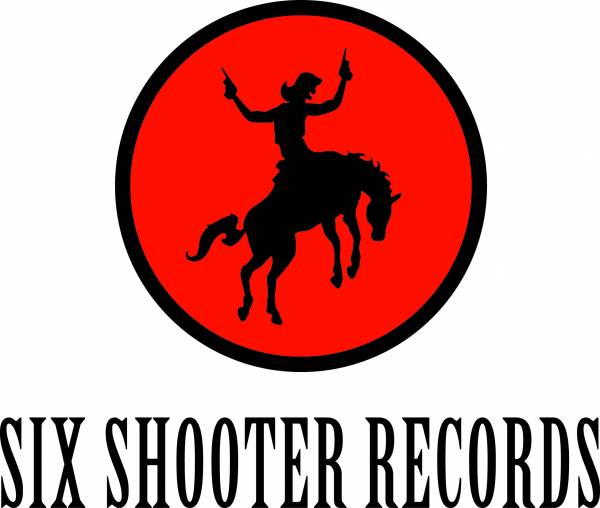 Six Shooter was viewed as a roots label then. The name has that connotation too. Did you have a vision for the type of music you would sign?
Six Shooter was viewed as a roots label then. The name has that connotation too. Did you have a vision for the type of music you would sign?
I’ll answer the name thing first. Coming up with a name for your label is a pretty big job.
I wanted something that evoked the Prairie spirit. I feel like the mindset and culture from the Prairies is different than it is in Ontario. It’s more pioneer, more maverick, more bootstrappy. So, I wanted something that meant that to me. I wanted something that evoked that spirit of the Wild West. And with the logo, the girl on a horse, that was important. The gender identity was always a key part of the branding of Six Shooter.
Were you aware it was unique for a woman in Canada to start a label?
No, I guess not. I hire mostly women. My business partner is a woman. I’m very closely identified as a woman-run business. But I didn’t feel like that should be unusual. I discovered that it was, but I also wasn’t particularly daunted by that.
Never felt that was an issue or obstacle?
I’m never the person that’s going to jump to conclusions that this situation is happening because of sexism; if I do conclude that that was the situation, it would be because I couldn’t come up with any other explanation. But looking back, I feel like there were a couple of times. kind of subtle. You don’t have the realization until 15 years later that certain opportunities or doors were not open to you, but that they were open to men who are less qualified.
Was it a conscious decision to hire more women than men?
I didn’t set out to build a company predominantly — two-thirds, at least — where the employees are women and I certainly have some amazing men that work for me. I don’t think it was necessarily a conscious move, but that I would be able to more rapidly recognize qualities in women that maybe other people didn’t. I wasn’t burdened by the same unconscious biases that men have. I don’t feel like being a woman is a disadvantage, necessarily. I don’t feel that way about myself, and so I don’t also think that way about other women.
Along the way, in addition to Six Shooter management and label, you started a publishing arm, had a record store [2006-2009], created two music festivals [two years of the Sleepwalker Guitar Festival; and 11 Interstellar Rodeo festivals, three in Winnipeg and eight in Edmonton, 2012 – 2019], and then, most recently, in 2019, another publishing company [High Priestess]. You did not stay in one lane.
People did not like that I was starting a music festival, that’s for sure. I think that women are constantly being underestimated. Do people want me to stay in my lane? I don’t think that applies to me. I’m a founder; I’ve founded a number of different kinds of things. If anything, I think people expect me to surprise them. A lot of women don’t have expectations that they want to move ahead, and, also, women themselves sometime hold themselves back.
Did you read the book Lean In? [Lean In: Women, Work, and the Will to Lead, by Nell Scovell and Sheryl Sandberg]. Sheryl Sandberg, the COO of Facebook [she stepped down in 2022], wrote a book about how sometimes when women know they want children, they don’t put themselves forward for a promotion. A lot of times, men put women on a “mummy track,” but the book talks about how women are also putting themselves there and why. One of the core mandates that Helen and I have is how to find new pathways for women to have families and careers.
You would bring babies into your office.
That’s how Helen and I became partners. The first baby I had, Fabienne, was born in 2003. My company was fledgling, and I was trying to get major distribution. In fact, there’s a funny story. I finally got a call back from EMI, and it was while I was in labour [laughs].
Did you take the call?
I did. I didn’t tell him that I was in labour because who’s gonna give a distribution deal to a record company that’s fully owned by a woman who’s about to give birth? [laughs]. You know, I didn’t get the deal. It wasn’t my best meeting [laughs]. I did have to put them on hold because my contractions were between five and 10 minutes apart. I hadn’t gone to the hospital yet, but this was happening.
So, anyway, I had this assistant who was ill. She had a brain tumour and it was clear I needed to go into the office. I couldn’t afford childcare. I just brought my baby into the office. Helen was one of the people I shared office spaces with. I didn’t really know her that well, but she loves babies. She found herself helping me a lot, and then I ended up hiring her part-time. After three months of having the support of this person who’s so smart, and just not bothered by if the task at hand needs to be to take care of the baby, or if it needs to be call college radio, whatever the job was Helen was up for it, and I was like, “This is the kind of support that I need,” so we became business partners. And we have been business partners now for 20 years.
In the whole entity?
Definitely in the management company. Helen is the president. She’s a way better manager than I am. She’s excellent, but in the label, it was trickier, because there’s lots of debt, actually. I’m the majority owner of the label. She is a partner in the label, too.
You mention debt. Did Canada’s grant opportunities help you build and sustain the label?
It wasn’t as relevant to me at the beginning as it is now. First of all, there wasn’t the kind of programs that there are now and, but I didn’t really get much funding for the first five years of starting Six Shooter. I actually funded the label with credit cards. I was probably $400,000 in credit card debt. Brutal. That was super-stressful. I’ve been on the verge of bankruptcy more than once.
That’s inspiring that you did that. All in.
The Canadian funding system is, first of all, the envy of all the music communities around the world. It’s excellent. When you’re in a small country like Canada, living next door to the behemoth that is America, that is dominant in so many ways, particularly culturally, how do you support the artists that are here telling Canadian stories and making art for the Canadian audience, so that they don’t all just leave and make art for Americans? It’s really important and it’s critical to our success.
Almost 25 years in and Six Shooter now has an incredibly diverse roster. No one sounds like July Talk. Tanya is in a category of her own. The Dead South is unique. Did your vision change for Six Shooter?
I just sign artists who make music that I love. It’s not really with any genre in mind. For me, it’s about excellence.
Sometimes, what happens with a label is you end up being associated with the genre of your most popular or successful artist. I did have a period, in 2005, and again, maybe more significantly in 2008, where the records that I was releasing, the roots records, were the most successful, and so that gave me this ‘Toronto Indie roots boutique label.’ I was finding that that that brand was becoming so strong that it was preventing other artists that I wanted to sign to the label from signing. They didn’t think it was a good fit. They were happy to have me manage them, but they didn’t want to sign to the label because they thought, “Not a roots artist.” So it became this constrictive thing. It was really around signing Tanya Tagaq that blew that wide open.
I always have this metaphor of Six Shooter as a house where artists can live to create the body of work within them. That’s what usually what I say and how I think about Six Shooter, but Tanya came in and she deconstructed the house.
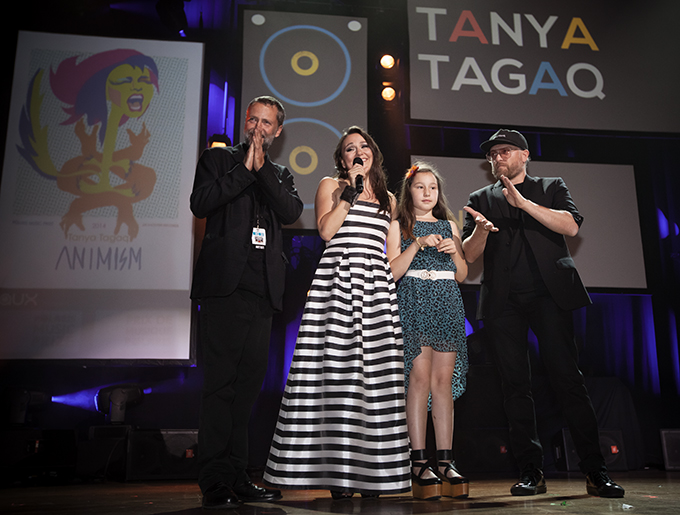
That immediately broadens Six Shooter.
The thing is, we didn’t know that Tanya was going to be as successful as she is. I mean, she’s considered to be a world music artist, a throat singer, the North Pole. We didn’t know that she was going to win Polaris [Music Prize, 2014] or this, that or the other thing that was going to happen with her. We just knew that she was this incredible artist that we really wanted to support and that we’re feeling pretty sure that we’re going to lose money on it — and I’ve done that before, where I know I’m going to lose money on this, but I’m so compelled by the art that I don’t care. Anyway, with Tanya, the success that she ended up having, I don’t want to say it was a surprise because she’s somebody that talented and that important.
We didn’t talk about the music festival. What is the status of Interstellar Rodeo?
We did 11 Interstellar Rodeos, eight in Edmonton and three in Winnipeg. Super proud of those events. They were incredible. We still have all of our Interstellar Rodeo umbrellas and picnic tables and our stage, stage set and banners and all that in storage in Edmonton. We’ve had it there for five years. So, I don’t know. I don’t want to say that we’re going to do another one, but the door for me isn’t totally closed if we had the right sort of partnership in place, that’s something that we might consider.
William Prince just did a big cross Canada theatre tour. Headlined Massey Hall in Toronto.
The William Prince story has really been front and center for me because I’m also his manager. We went into the release of his record [Stand In The Joy] at the beginning of 2023. Probably one of the most well-defined strategies I’ve ever put into place for an artist, and we were able to hit most of those targets. The rise of William Prince in such a short period of time — it’s been exactly five years since I started working with him — just to have him headline the largest theaters across the country, from coast to coast, is a really incredible accomplishment for both of us. He’s definitely one of the brightest stars in our constellation, but not the only one.
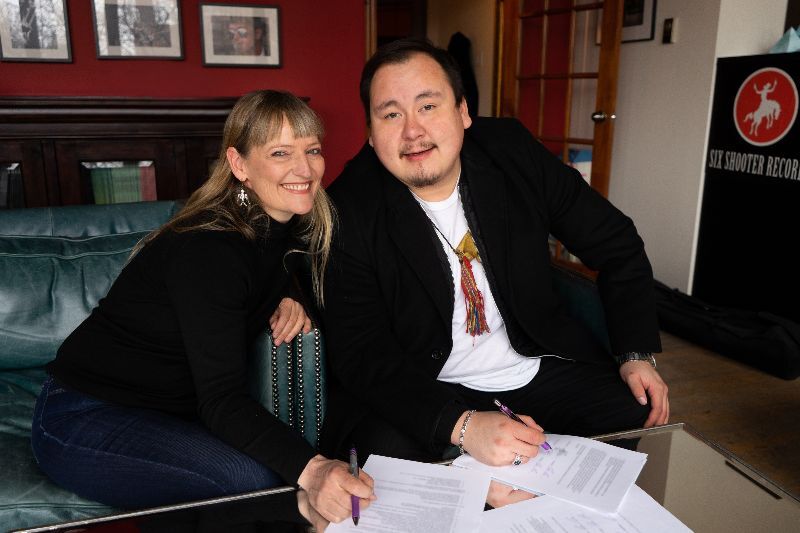
The Dead South, they’re our biggest band. We have been all hands-on deck, strategizing and working super hard on the build-up towards the release of their record, which we just released, called Chains & Stakes. That’s been a monumental amount of work for everybody at Six Shooter. Everybody is engaged on that. We manage them as well, and Helen has really been lead on that. [VP of marketing and publicity] Emily Smart’s strategic and creative direction that she put on the label side has just been really incredible. So, that’s on its way to being a huge success.
We also have a lot of new projects in the fire. Peter Dreams [Dreimanis] from July Talk has a solo record coming out, and Boy Golden has another record coming out. I signed an artist last year, Nyssa, who I think is a goddess and we just released her record in February, and she has been doing the showcase circuit, SXSW, Great Escape, and other things, introducing her to the world. We also signed T. Thomason. His record is coming out this year, too,
That’s a lot of brand-new projects, so things are pretty busy.


